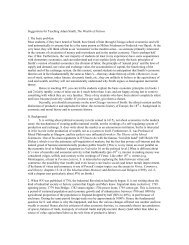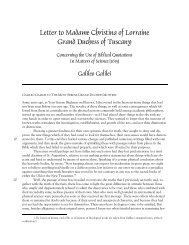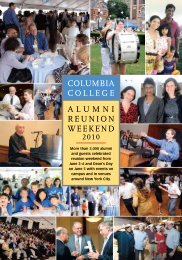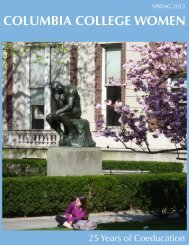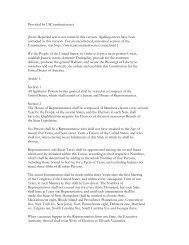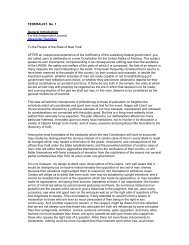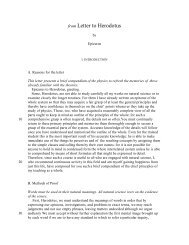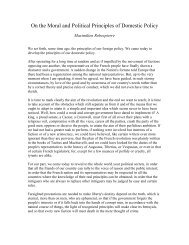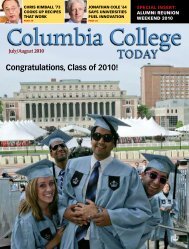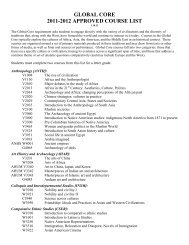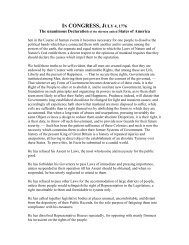Download this issue as a PDF - Columbia College - Columbia ...
Download this issue as a PDF - Columbia College - Columbia ...
Download this issue as a PDF - Columbia College - Columbia ...
You also want an ePaper? Increase the reach of your titles
YUMPU automatically turns print PDFs into web optimized ePapers that Google loves.
AI-JEN POO ’96<br />
COLUMBIA COLLEGE TODAY<br />
COLUMBIA COLLEGE TODAY AI-JEN POO ’96<br />
“Fear often gets in the way of our taking risks necessary to<br />
make real change in the world,” Poo adds. “The tattoo is a reminder<br />
to draw upon my inner tiger and to be courageous in the<br />
face of uncertainty in the service of a vision for a better world.”<br />
DWU w<strong>as</strong> the major force behind New York’s Domestic<br />
Workers’ Bill of Rights, which took effect on November 29, 2010,<br />
three months after then-Gov. David Paterson ’77 signed it into<br />
law. The country’s first, it entitles domestic workers to overtime<br />
pay, one day of rest a week, three paid days off a year after one<br />
year with the same employer and inclusion in the state’s Human<br />
Rights Law, which protects against sexual har<strong>as</strong>sment and discrimination.<br />
The law applies to all domestic workers regardless<br />
of legal status (there are an estimated 200,000 domestic workers<br />
in the New York metropolitan area, according to DWU). California’s<br />
state legislature is considering a similar bill.<br />
“It w<strong>as</strong> a breakthrough moment,” Poo says. “We forced the<br />
state of New York to recognize domestic work <strong>as</strong> real work that<br />
deserves inclusion and protection, and reversed a legacy of exclusion<br />
and discrimination.”<br />
the 1996 protests that called for more culturally diverse course<br />
offerings. Three years later, <strong>Columbia</strong>’s Center for the Study of<br />
Ethnicity and Race w<strong>as</strong> established.<br />
“We were all working together with one really strong message<br />
to push the University to recognize <strong>this</strong> piece of intellectual<br />
work that is so important to how <strong>this</strong> country h<strong>as</strong> unfolded,”<br />
Poo recalls. “We wanted to send a message of how important it<br />
w<strong>as</strong> for students to have access to that information.<br />
“Students really worked together across communities. That<br />
w<strong>as</strong> one of the things that w<strong>as</strong> so powerful about it. It w<strong>as</strong> a really<br />
exciting time. It informed how I understood how change happens<br />
and gave me a sense of the potential of organizing.”<br />
Born in Pittsburgh to Chinese immigrants, Poo transferred to<br />
the <strong>College</strong> after a year at W<strong>as</strong>hington University in St. Louis,<br />
where she had enrolled with plans to become a potter. “I missed<br />
reading books, literature in particular,” says Poo, whose father,<br />
Mu-ming Poo, w<strong>as</strong> a pro-democracy activist in Taiwan and<br />
taught in <strong>Columbia</strong>’s Department of Biological Sciences from<br />
1988–95; her mother is an oncologist.<br />
“Ai-jen makes the possibility for radical change palpable.<br />
She not only believes in the b<strong>as</strong>ic goodness of all people but also<br />
that we all inherently want fairness and equality to prevail.”<br />
For more than five years after Assemblyman Keith Wright<br />
(D-Manhattan) and Sen. Diane Savino (D-Brooklyn/Staten Island)<br />
introduced the bill into the state legislature in 2004, DWU<br />
staffers drove workers to Albany to lobby. Poo estimates that<br />
she made upward of 50 trips herself. Among those who shared<br />
their stories with lawmakers, she notes, w<strong>as</strong> a Colombian woman<br />
in her 60s who cared for a disabled child in order to afford insulin<br />
for her own son. She worked more than 100 hours a week<br />
for about $3 an hour, cooking, cleaning, w<strong>as</strong>hing and ironing for<br />
the family of six, only to retire at day’s end to a b<strong>as</strong>ement with<br />
an overflowing sewage system. She w<strong>as</strong> fired suddenly without<br />
severance pay. Other workers testified to humiliations and<br />
sexual har<strong>as</strong>sment by male employers.<br />
“I’ve been fortunate to be a part of many collective efforts that<br />
involved sacrifice, spirit, heart and commitment on the part of a<br />
lot of domestic workers,” says Poo of DWU’s work. “It w<strong>as</strong> never<br />
me alone.”<br />
Domestic workers are excluded from the National Labor Relations<br />
Act, which protects the rights of most other private workers<br />
to form unions, strike and bargain collectively. Nonetheless,<br />
DWU h<strong>as</strong> close to 7,000 members who pay $5 a month in dues<br />
in return for free legal <strong>as</strong>sistance, immigration advice and help<br />
with resume building and job searching. Funding comes mostly<br />
from private foundations. The organization’s board comprises<br />
nine members who collaborate with director Priscilla Gonzalez<br />
’98 Barnard, herself the daughter of a domestic worker.<br />
“Ai-jen makes the possibility for radical change palpable,” says<br />
Gonzalez. “She not only believes in the b<strong>as</strong>ic goodness of all people<br />
but also that we all inherently want fairness and equality to prevail.”<br />
Poo realized the power of gr<strong>as</strong>sroots activism <strong>as</strong> a <strong>College</strong><br />
student. She w<strong>as</strong> arrested in April 1995 for blocking<br />
the Manhattan Bridge <strong>as</strong> part of a city-wide protest<br />
against police brutality. She also w<strong>as</strong> among the students<br />
who occupied Low Rotunda and Hamilton Hall during<br />
“I w<strong>as</strong> excited about having New York City <strong>as</strong> a place to learn<br />
and grow,” she adds.<br />
Within a year of her arrival, Poo shifted her focus from art to<br />
women’s studies. “I’ve been really p<strong>as</strong>sionate about women’s<br />
<strong>issue</strong>s since high school,” she says. “When I got to <strong>Columbia</strong>,<br />
the women’s studies department offered the opportunity to explore<br />
the intellectual work that had been done around women’s<br />
rights and how gender h<strong>as</strong> shaped our world and our history.<br />
“There are a lot of strong women in my family tradition,” adds<br />
Poo, whose family includes sister Ting Poo ’00, a post-production<br />
film editor. “My grandmothers and my mom are very important<br />
role models for me.”<br />
Soon after arriving in New York, Poo began staffing a hotline<br />
<strong>as</strong> a volunteer at the New York Asian Women’s Center, a<br />
domestic violence shelter for Asian immigrant women, where<br />
she got her first t<strong>as</strong>te of women’s activism. She later became involved<br />
with the Committee Against Anti-Asian Violence, where<br />
she w<strong>as</strong> promoted to paid staff member upon graduation. Poo<br />
co-founded DWU with colleagues from CAAAV, where she had<br />
spearheaded an initiative that sought to empower Asian immigrant<br />
women employed in low-wage service industries.<br />
Poo met her husband, attorney Tony Lu, while recruiting volunteers<br />
for CAAAV at NYU Law School, where Lu earned a J.D.<br />
Lu now works for Pro Bono Net, a nonprofit that uses web technology<br />
to incre<strong>as</strong>e access to justice for people who cannot afford<br />
lawyers. The couple lives in Queens.<br />
Poo now heads the NDWA, a coalition she helped establish<br />
in 2007. It encomp<strong>as</strong>ses more than 30 member organizations nationwide<br />
that seek respect and fair labor standards for domestic<br />
workers. Though b<strong>as</strong>ed in New York, Poo travels frequently to<br />
meetings and public speaking engagements.<br />
The NDWA celebrated in June when delegates to the International<br />
Labour Conference — the annual meeting of the member<br />
states of the U.N.’s International Labour Organization — adopted<br />
the Convention on Decent Work for Domestic Workers. The<br />
While Poo credits the collective efforts of fellow advocates for her groups’ success, she still is on the front line and speaking out.<br />
PHOTO: COURTESY AI-JEN POO ’96/NDWA<br />
international treaty for the first time entitles domestic workers to<br />
fundamental labor rights and is binding for the states that ratify<br />
it. Though the United States h<strong>as</strong> not done so, the NDWA worked<br />
with the Department of Labor to draft the federal government’s<br />
response. (The NDWA also had sent a domestic worker to the<br />
conference <strong>as</strong> a voting delegate.)<br />
In 2011, Poo’s groundbreaking work earned her the American<br />
Express NGen Leadership Award bestowed by Independent<br />
Sector, a leadership network for charities and foundations. The<br />
award recognizes nonprofit leaders under 40 who have had a significant<br />
impact on a societal need. The $3,000 grant h<strong>as</strong> gone toward<br />
training and capacity building for domestic worker leaders.<br />
“Ai-jen is a leader of the present and future,” says Mikaela<br />
Seligman, Independent Sector’s v.p. of nonprofit and philanthropic<br />
leadership and practice. “The way she sees leadership is<br />
that her role is not to be out in front publicly or privately, somehow<br />
leading the charge, which is really a model of the p<strong>as</strong>t. Her<br />
role is fundamentally to mobilize resources to achieve a goal. She<br />
does that ably, she does that graciously and she does it with love.”<br />
In 2009, the Center for Social Inclusion awarded Poo the<br />
$25,000 Alston-Bannerman Fellowship for Organizers of Color,<br />
which allowed her to take a four-month sabbatical, part of which<br />
she spent re-energizing in Hawaii, a logical destination once she<br />
mentions her affinity for the outdoors and “places where mountains<br />
and ocean meet.” Poo’s husband and a few friends accompanied<br />
her for part of the trip, but she also spent time alone practicing<br />
yoga and sleeping at le<strong>as</strong>t eight hours each night, which<br />
she rarely gets to do. Moreover, she used the time off to convoke<br />
a national meeting of female organizers. That same year, Crain’s<br />
New York Business named her one of its “40 Under 40” rising stars.<br />
Then came Time’s “100 Most Influential People in the World” list<br />
<strong>this</strong> spring.<br />
Ever-humble, Poo is quick to attribute such accolades to her<br />
cause rather than her aptitude. “It’s really recognition of both the<br />
importance of domestic work in society today and the significance<br />
of domestic workers organizing, advocacy and leadership<br />
in the social change arena,” she says. “I feel proud to be a part of<br />
a movement that inspires so many people.”<br />
To view videos of Poo, go to Web Extr<strong>as</strong> at college.columbia.edu/cct.<br />
Nathalie Alonso ’08 is a freelance journalist and an editorial producer<br />
of L<strong>as</strong>Mayores.com, Major League B<strong>as</strong>eball’s official Spanish language<br />
website. She also writes Student Spotlight for CCT.<br />
FALL 2012<br />
42<br />
FALL 2012<br />
43



